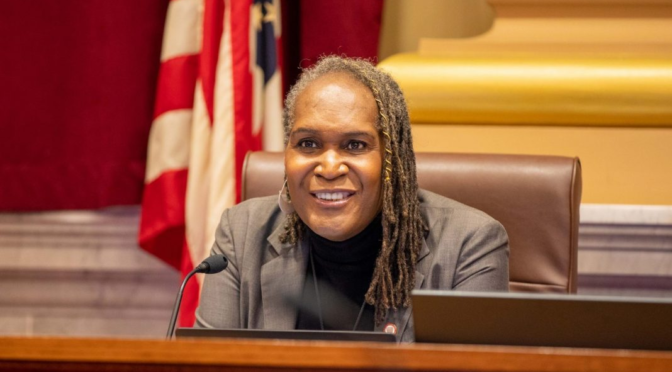“As an African American trans-identified woman, I know firsthand the feeling of being marginalized, left out, thrown under the bus. Those days are over. We don’t just want a seat at the table, we want to set the table.”
Andrea Jenkins
The horrific murder of George Floyd thrust Andrea Jenkins, the Minneapolis City Council member who represents the ward where the crime took place, into the national spotlight. Outraged over yet another brutal injustice perpetrated by racist police officers, Andrea maintained her poise and dignity, beginning a press conference by beautifully singing Amazing Grace, and calling for peaceful protests. However, that was not the first time Jenkins fought to bring respect and equal treatment for marginalized people. She has spent her life tirelessly fighting for the human rights of everyone.
Andrea Jenkins was born in Chicago, Illinois and was raised by her mother. Although they lived in some pretty rough places, Jenkins’ mother was very loving and emphasized the importance of getting a good education. As a child, Jenkins presented as male but it didn’t feel right to her. While on a bus ride with her mother when she was about six, Jenkins saw two trans women on the street and knew that was how she felt inside. When she noticed the other passengers on the bus mocking and laughing at the women, she realized it was best not to let anyone know how she felt. Publicly she did the things other boys did, joined cub scouts, played football, dated girls. Privately she would sneak into her mom’s closet and dress in her clothes.
She went to the University of Minnesota where she continued hiding who she truly was. She joined a fraternity where she was well-liked and elected president. When one of her fraternity brothers came home early and caught her with a man, the people she had thought were friends were suddenly yelling at her, calling her all sorts of things, and kicking her out of the house. It took another ten years, getting married to a woman, becoming a parent, getting divorced, and coming out as gay before Jenkins was ready to let the world see her true beauty as a woman.
Jenkins got involved in local government affairs in order to help others. She worked as a vocational counselor, and as an aide to city council members, before becoming the first black openly trans person to be elected to public office in the United States, when she was elected to the city council member. She currently serves as the President of Minneapolis City Council. Through her government work Jenkins helped establish the Transgender Work Group and organized a City Council summit on transgender equity. As president of the city council she said, “I’m certainly going to lead with compassion. I’m going to be very upfront and vocal about bringing the notion of love into the public discourse. Dr. Cornel West says justice is what love looks like in public. So how do we bring justice to this community? That’s what I hope to lead with over these next two years: a sense of community, connectedness, and moving forward to make life better for the most marginalized people in our community.”
Jenkins likes to be involved, to keep busy, to make things happen. In addition to her work with the city council, she is also the curator of the University of Minnesota’s Transgender Oral History Project. This project has recorded hundreds of hours of interviews with transgender people in Minneapolis, Chicago, and the rural areas of the Midwest. Those interviews are being categorized and posted online as a permanent record of what it’s like growing up trans, knowing you don’t fit the body you were born with. The goal of this project is to help change the way people view their transgender, family, friends, neighbors, and coworkers.
Minnesota Monthly magazine listed Andrea Jenkins as a “champion for change”. A very apt label for Jenkins. Although the list of her accomplishments thus far is impressive, she is just getting started. Through whatever office she holds, whatever job she may accept, or whatever activities in which she is involved, she will continue to fight for the dignity, respect, and human rights every person should have.
“Andrea and I worked with very low-income people, primarily people of color, who were on the welfare system. I found she was so capable and confident and compassionate that people quickly got over their preconceived notion or phobia and realized she was there to help them.”
Former Minnesota State Senator – Jeff Hayden
